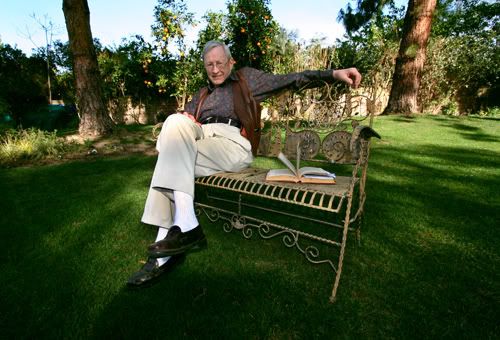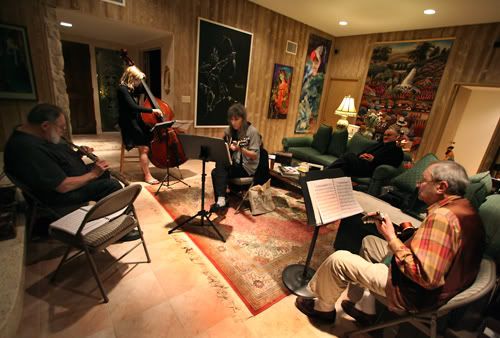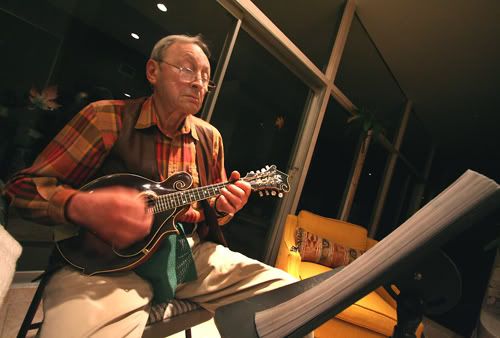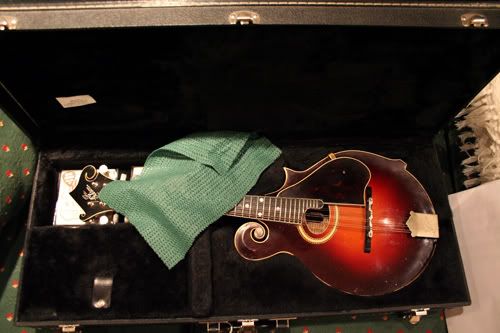 William Bloom is an 81-year-old CSUN student who is in the over-60s life-long learning program, which allowed him to attend classes on campus, nearly free-of-charge, for the past 16 years. Bloom says that his continued education is for a “life-long pursuit” of knowledge.
William Bloom is an 81-year-old CSUN student who is in the over-60s life-long learning program, which allowed him to attend classes on campus, nearly free-of-charge, for the past 16 years. Bloom says that his continued education is for a “life-long pursuit” of knowledge.
For a lot of us, the rugged terrain that is the pathway to a higher education ends with our tassels being moved from one side of our graduation cap to the other, followed by a congratulatory message from a dean of some sort. Few go on to pursue their education and the motivation for such action is usually to eventually make more money in the working world or to teach. If you were to ask a random CSUN student what his or her reason for attending school would be, seldom would you hear “because I simply want to learn.” But seldom doesn’t mean never, and William Bloom is a Bronx-born student who would tell you that a love of learning is why he is enrolled in college, a reasoning which he has taken to heart, attending CSUN classes at the age of 81.
Bloom made his way to California by way of New York when he joined the Navy in 1945, halting his studies at City College of New York (CCNY). After doing his training in different parts of the country, he ultimately ended up in San Diego before being shipped out to the Philippines to replace the sailors who had enough points to come home from the war.
Following his stay on a floating dry-dock, a vessel made for conducting submarine and ship repairs, the dock was supposed to be taken to Guantanamo Bay, Cuba via sea tow. At a speed of four knots, the dry-dock was taken across the Pacific Ocean, making its first land stop at Los Angeles. Bloom said the first sight of land was enough to get him off the vessel because traveling at four knots from the Philippines to America was “slower than Christopher Columbus.” After being in Los Angeles, Bloom eventually went back to New York to finish school at CCNY, eventually getting his Bachelors in Business Administration in 1958. He then returned to California, where he continued taking courses and accumulating knowledge of all kinds.
Bloom’s continued pursuit of education holds no promises of a credited placard or certificate to put on his wall-he reached that goal 50 years ago. Nor will it add a new formal title, such as doctor, to the front of his name-and that is perfectly fine with him. To Bloom, such acclamations generally sought after by most students on any college campus pale in comparison to the value of the knowledge acquired in the classes he takes, which he can add to the vast range of experiences and skills he already has.
 A picture of Bloom playing the mandolin at a recital hall sits on the coffee table of his house next to a small stack of literature, one of them being “The Music-Lover’s Birthday Book.”
A picture of Bloom playing the mandolin at a recital hall sits on the coffee table of his house next to a small stack of literature, one of them being “The Music-Lover’s Birthday Book.”
“I’ve just accumulated, God knows, how many credits or units that are going nowhere, and that I intend to go nowhere, as far as getting anywhere to receive an advanced degree, because it is serving my pleasure. And that is the greatest way to go through college, with pleasure,” says Bloom.
The 16 years Bloom has spent attending courses at CSUN has been made available to him, nearly free-of-charge, by an over-60s “life long learning” program that was implemented by the California State University system. The program allowed any California resident that was of age 60 or older, and could matriculate, to attend almost any of the classes offered on campus for a fee of $3 per semester.
“In the over-60s program, life long learners could go take classes and you go for your masters and go for anything you want to do-do as you wish. That is what I was doing for the past 16 years,” says Bloom.
At the time he started attending classes at CSUN under the life-long learning program, there were more students in the same program on campus, but, Bloom recalls, the oncoming semesters saw a steady decline in his fellow life-long learners before the program ended. Bloom recalls, “Before, it was possible I would run across someone else who was in the (over 60s program) in a class, but as the years rolled by, there were less and less of ‘me’s around.”
Despite CSUN seeing an end to the program, Bloom’s continued presence on campus over the years allowed him to continue his studies with no adjustment to his standing as a life-long learning student.
During the 16 years he’s been a student at CSUN, Bloom dove headfirst into obtaining all the historical knowledge that a decade and half of attending university could provide, taking every history class that has been offered on campus during that time.
It has come to a point, Bloom laughs, where now he has to peruse the course catalogue every semester looking for a class that can reach out and grab his interest. Although the course load has lightened up for Bloom, semesters like Spring 2008 still offer him a new class and a new chance to learn.
“I’ve been taking courses for a while, I’ve gone through the history department, but good, I cleaned that out, I think,” chuckles Bloom. “But in general, not just history, once in a while I find something that I hadn’t taken, so I jump in,” referring to the only class he is enrolled in this semester, Mexican Philosophy with Central American Studies professor Marina Gonzalez.
But Bloom’s attendance at CSUN has not been so dry as to merely chalk it up as one big long history lesson. Remember, he said he attended college for pleasure. Bloom had always had a love for playing instruments, which he incorporated into his class scheduling, taking numerous courses in the music department during his time at CSUN. For Bloom, one of his most memorable classes ever taken was through the music department, when they offered a mariachi music class.
 Bloom, basist and CSUN Jazz Studies sophomore Mindy Bishop, guitarist Natalie Russell, and saxophonist George Probert play for an audience of one, a family friend, during their practice session at Bloom’s house in Woodland Hills.
Bloom, basist and CSUN Jazz Studies sophomore Mindy Bishop, guitarist Natalie Russell, and saxophonist George Probert play for an audience of one, a family friend, during their practice session at Bloom’s house in Woodland Hills.
“To me, one of the most memorable, most happiest course I took at CSUN was a mariachi class, which they had for two semesters, or maybe three, but, unfortunately, my class was the last one,” Bloom says. “We had, oh wow, we had around a 20-piece band at the time?and boy, that was a great course. That was some group we had.”
The multi-faceted student grew up playing the mandolin when he was still a young boy, and later learning to play the banjo, along with the domra and balaika, stringed instruments that are likened to the mandolin and generally heard in Russian folk music.
Even now, Bloom plays in numerous bands, including a Dixieland Jazz band, a Russian Folk orchestra, a Klezmer temple band and a four-piece band that meets at his house to play music, that includes CSUN student Mindy Bishop, who plays a standup bass, along with Blooms mandolin and the other two pieces, which had Bloom’s friends Natalie Russell on guitar and George Probert on the saxophone.
Bishop, the Jazz Studies sophomore, met Bloom while walking to class one day, when he noticed she was carrying her bass to class, which was something that caught his attention immediately. As Bloom put it, “I was sitting down and I saw this wonderful lady carrying a double bass, so I yelled, ‘hey lady with the double bass!’ and the rest is history.”
 Bloom plays the mandolin during a practice session at his house with one of the numerous bands o
Bloom plays the mandolin during a practice session at his house with one of the numerous bands o
f which he is a member.
Bishop gave a little more detail, saying that they began talking and she was asked to be in the band, which she has been playing with for about two months. “That’s how you get a lot of gigs. People see you with an instrument and people say, ‘hey, I play in a band, do you want to play with us,’ and fortunately, this one worked out really well,” says Bishop. “At first, I only talked to him for a few minutes, but when I came to the house to play with the band, he was so welcoming and friendly and so were the band members, so it was a good situation.”
Although he has met many people through attending college courses throughout his life, both during and before entering the life-long learning program, his most memorable and most important encounter was when he was taking an extended courses at UCLA on existential psychology, where he met his wife, Litha. The class itself was unique and stands out in his mind because, although it was only for one quarter, the students held discussions about the coursework long after the official class was over.
“The course began one quarter, and kids were so intrigued with it, it became like a floating craps game, and each week the course continued in a different student’s home,” recalls Bloom. “My wife was doing a friend a favor?and took the course with her, and that’s where I met her. A friend of mine who was taking the course brought me in, and (my wife’s friend) brought her in, and that’s how we met-and that was that.” They have been married for 42 years.
He also utilized his academic involvement to facilitate world travel as well since retiring from being a business broker and his wife retired from being a teacher. After his enrollment in the denazification class from Fall 2007, taught by professor Michael Meyer, Bloom, his wife and students who attended the class will travel to Europe for the summer, visiting Berlin and Prague.
“Education is a lifelong endeavor,” says Bloom, expressing his feelings of why he plans to continue attending classes. “That is the theme of the whole thing. Education is a lifelong pursuit and I follow it.”
 Bloom’s mandolin.
Bloom’s mandolin.





